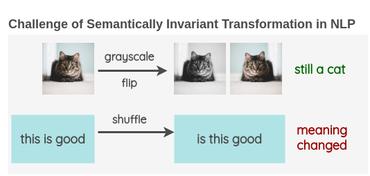Search Results for author: Congcong Wang
Found 13 papers, 7 papers with code
Coping with low data availability for social media crisis message categorisation
no code implementations • 26 May 2023 • Congcong Wang
It first presents domain adaptation as a solution for this problem, which involves learning a categorisation model from annotated data from past crisis events (source domain) and adapting it to categorise messages from an ongoing crisis event (target domain).
STA: Self-controlled Text Augmentation for Improving Text Classifications
1 code implementation • 24 Feb 2023 • Congcong Wang, Gonzalo Fiz Pontiveros, Steven Derby, Tri Kurniawan Wijaya
Despite recent advancements in Machine Learning, many tasks still involve working in low-data regimes which can make solving natural language problems difficult.
UCD-CS at TREC 2021 Incident Streams Track
1 code implementation • 7 Dec 2021 • Congcong Wang, David Lillis
In recent years, the task of mining important information from social media posts during crises has become a focus of research for the purposes of assisting emergency response (ES).
Transformer-based Multi-task Learning for Disaster Tweet Categorisation
1 code implementation • 15 Oct 2021 • Congcong Wang, Paul Nulty, David Lillis
Social media has enabled people to circulate information in a timely fashion, thus motivating people to post messages seeking help during crisis situations.
Crisis Domain Adaptation Using Sequence-to-sequence Transformers
1 code implementation • 15 Oct 2021 • Congcong Wang, Paul Nulty, David Lillis
In this paper, we investigate how this prior knowledge can be best leveraged for new crises by examining the extent to which crisis events of a similar type are more suitable for adaptation to new events (cross-domain adaptation).
Multi-task transfer learning for finding actionable information from crisis-related messages on social media
no code implementations • 26 Feb 2021 • Congcong Wang, David Lillis
Based on this approach, we submitted several runs to the track.
Stereo Correspondence and Reconstruction of Endoscopic Data Challenge
no code implementations • 4 Jan 2021 • Max Allan, Jonathan McLeod, Congcong Wang, Jean Claude Rosenthal, Zhenglei Hu, Niklas Gard, Peter Eisert, Ke Xue Fu, Trevor Zeffiro, Wenyao Xia, Zhanshi Zhu, Huoling Luo, Fucang Jia, Xiran Zhang, Xiaohong Li, Lalith Sharan, Tom Kurmann, Sebastian Schmid, Raphael Sznitman, Dimitris Psychogyios, Mahdi Azizian, Danail Stoyanov, Lena Maier-Hein, Stefanie Speidel
The stereo correspondence and reconstruction of endoscopic data sub-challenge was organized during the Endovis challenge at MICCAI 2019 in Shenzhen, China.
AbdomenCT-1K: Is Abdominal Organ Segmentation A Solved Problem?
1 code implementation • 28 Oct 2020 • Jun Ma, Yao Zhang, Song Gu, Cheng Zhu, Cheng Ge, Yichi Zhang, Xingle An, Congcong Wang, Qiyuan Wang, Xin Liu, Shucheng Cao, Qi Zhang, Shangqing Liu, Yunpeng Wang, Yuhui Li, Jian He, Xiaoping Yang
With the unprecedented developments in deep learning, automatic segmentation of main abdominal organs seems to be a solved problem as state-of-the-art (SOTA) methods have achieved comparable results with inter-rater variability on many benchmark datasets.
UCD-CS at W-NUT 2020 Shared Task-3: A Text to Text Approach for COVID-19 Event Extraction on Social Media
1 code implementation • EMNLP (WNUT) 2020 • Congcong Wang, David Lillis
The objective of this task is to extract answers from COVID-related tweets to a set of predefined slot-filling questions.
Adaptive Context Encoding Module for Semantic Segmentation
no code implementations • 13 Jul 2019 • Congcong Wang, Faouzi Alaya Cheikh, Azeddine Beghdadi, Ole Jakob Elle
The object sizes in images are diverse, therefore, capturing multiple scale context information is essential for semantic segmentation.
Generative Smoke Removal
1 code implementation • 1 Feb 2019 • Oleksii Sidorov, Congcong Wang, Faouzi Alaya Cheikh
In minimally invasive surgery, the use of tissue dissection tools causes smoke, which inevitably degrades the image quality.
Can Image Enhancement be Beneficial to Find Smoke Images in Laparoscopic Surgery?
no code implementations • 27 Dec 2018 • Congcong Wang, Vivek Sharma, Yu Fan, Faouzi Alaya Cheikh, Azeddine Beghdadi, Ole Jacob Elle, Rainer Stiefelhagen
For feature extraction, we use statistical features based on bivariate histogram distribution of gradient magnitude~(GM) and Laplacian of Gaussian~(LoG).
A Smoke Removal Method for Laparoscopic Images
no code implementations • 22 Mar 2018 • Congcong Wang, Faouzi Alaya Cheikh, Mounir Kaaniche, Ole Jacob Elle
In laparoscopic surgery, image quality can be severely degraded by surgical smoke, which not only introduces error for the image processing (used in image guided surgery), but also reduces the visibility of the surgeons.











